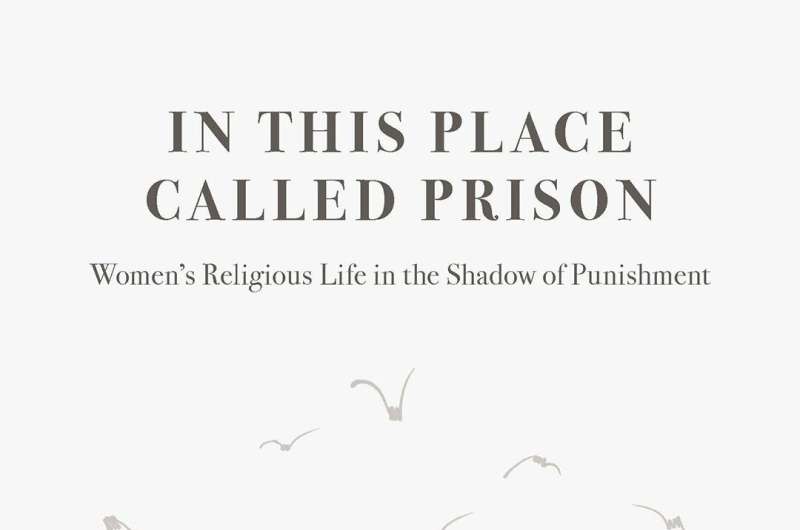This article has been reviewed according to Science X's editorial process and policies. Editors have highlighted the following attributes while ensuring the content's credibility:
fact-checked
trusted source
proofread
Researcher's new book reveals spirituality is a powerful force in women's prisons

A subject treated as an afterthought in many studies of imprisonment—religion—and an incarcerated group often regarded as peripheral—women—are the core of a University of Maryland researcher's groundbreaking new book on the deep spirituality that, perhaps not surprisingly, exists behind bars.
"When we think of 'paying a debt to society,' when we think about conviction, penitence, redemption—these are all religious terms," said criminology and criminal justice Assistant Professor Rachel Ellis, whose "In This Place Called Prison" was published this month by University of California Press.
Based on nearly 500 hours of observations of prison life and interviews with incarcerated women, chaplains, volunteers, wardens, corrections officers and other members of an unidentified prison community, the book provides a close-up view of day-to-day religious practice of a fraction of the approximately 170,000 women incarcerated in the United States. It's not a side issue, but often the main event, she said.
"It has an impact on daily life, even for women who do not practice religion," she said.
Most previous studies of incarcerated religious life focused on men, particularly whether religious affiliation correlates to pro-social behavior and fewer rule infractions while in prison—finding that on the whole, it does. Some criminologists have also explored whether religious affiliation correlates to better outcomes once people are released, which is also generally the case.
Ellis found perceived benefits in her study as well: Common themes included the ways religion helped women survive prison and navigate prison rules. One woman told her that incarceration—and God—saved her from the dangerous path her life was taking: "I realized He brought me here to get my attention."
She also studied religious demographics and how affiliation affects prisoners' lives. The majority who Ellis visited in prison identified as faith community members: 63% Protestant Christian, 7% Catholic, 5% Sunni Muslim, 4.5% Lutheran, 3.5% Wiccan and Jewish 1.5%; other religious traditions and those who did not respond to the survey accounted for the rest. Ellis interviewed Protestant, Catholic, Muslim and Jewish women, as well as those who identify as atheist or agnostic. Most interviewees reported that their beliefs and their ability to congregate to practice their religion had a positive impact on their experience in prison.
"Worship services are the only place where incarcerated women are allowed to hug or embrace each other," Ellis said. "There is a real feeling of community and support that comes from participating in religious programs."
Legally, incarcerated people must have access to one worship service and one scripture-based service a week, as well as accommodations for special religious requirements, such as dietary rules. Beyond those minimums are many extra opportunities and gifts provided by volunteers and charitable organizations, and to an overwhelming extent, Protestant Christians benefit, while those of other traditions or no faith are often excluded.
"They may receive a notebook or sugar cookies as part of their participation in Bible study," Ellis said. "That creates a dynamic where some women are getting more, just because of what religious affiliation box they ticked when they entered prison."
Across religions, Ellis said religious faith helped many interviewees manage to not only accept harsh punishments, long sentences or parole denials, but to find meaning in the difficult times.
"A common theme that I heard was that 'I'll get out in God's time,'" Ellis said. "Many women I talked with believed that if they were denied parole or if they were serving a long sentence, it was because God had work for them to do in prison. They found a profound sense of purpose in that belief."
One key finding: Women in prison who are members of faith communities are reframing what it means to be imprisoned. In their minds and hearts, and in their faith communities, Ellis said, religious women in prison are rewriting narrative punishment and forgiveness.
"Women are told by the prison system, 'you deserve punishment, you're serving time for your crimes,'" Ellis said. "But what they are hearing from religious teachings is different. The prison chaplain said to me, 'I look and see a woman who God loves. I don't see a criminal.'"
Ellis hopes her book will help religious leaders and volunteers understand how meaningful their work in prisons is to people of faith, particularly those of minority religious communities.
"How transformative it would be if people of many faiths could invest their time and resources into prison ministry," Ellis said. "For example, even if there are only a handful of Catholic or Jewish women in a prison community, or only a few Muslim women, those women's faith lives are still very important."
Provided by University of Maryland





















